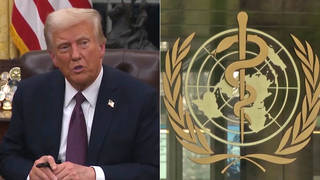
By Amy Goodman and Denis Moynihan
President Donald Trump and Larry Kudlow, the Director of Trump’s National Economic Council, aren’t doctors, but they play them on TV. As the coronavirus epidemic spirals into a pandemic, causing a plunge in the U.S. stock market, Trump and Kudlow, a former CNBC TV host, are cynically spreading disinformation about the contagion.
“We have contained this. I won’t say airtight, but it’s pretty close to airtight,” Larry Kudlow told CNBC Tuesday. Also on Tuesday, Trump Tweeted, “Low Ratings Fake News MSDNC (Comcast) & @CNN are doing everything possible to make the Caronavirus (sic) look as bad as possible, including panicking markets…USA in great shape!”
These statements directly contradicted a dire warning issued earlier that day by Dr. Nancy Messonnier, Director of the National Center for Immunization and Respiratory Diseases. She said on a press call, “The global novel coronavirus situation is rapidly evolving and expanding…[meeting] two of the criteria of a pandemic. The world moves closer towards meeting the third criteria: worldwide spread of the new virus.”
Referring to an outbreak in the U.S., Dr. Messonnier said, “It’s not so much a question of if this will happen anymore but rather …exactly when this will happen and how many people in this country will have severe illness.”
As of Wednesday night, there were more than 82,000 confirmed cases of coronavirus infections globally, and 2,800 deaths, as reported by a team at Johns Hopkins University. Most of these cases were in China, but the virus has been detected on every continent save Antarctica, with deaths also reported in Iran, Italy, France, Japan, the Philippines, Taiwan, Hong Kong, and aboard the “Diamond Princess” cruise ship, quarantined in Yokohama, Japan.
One of the most critical actions a government can take to prevent or to limit a pandemic is to clearly communicate accurate information to as wide a population as possible.
That is probably why Li Wenliang, a 34-year-old ophthalmologist at Wuhan Central Hospital, China, shared his observations on the outbreak as he was treating patients on December 30th. The Chinese government censored his posts, and he was ordered to a police station to sign a confession that he had made “untrue statements” on social media. At least seven others were similarly harassed. Days later, Li Wenliang became sick with coronavirus, and was hospitalized. He died on February 6th. His death sparked widespread criticism of the Chinese government for suppressing news of the epidemic’s severity and for punishing a courageous whistleblower. The 47-year-old director of the Wuhan hospital died of the same viral infection not long after.
China mounted a massive response, building a 1,000 bed hospital in less than a week, and locked down Wuhan and other huge cities, quarantining up to 100 million people.
In the U.S., as the number of confirmed coronavirus cases increases, our preparedness, or lack thereof, is causing concern.
Pulitzer Prize winning science journalist Laurie Garrett recently reported in Foreign Policy, “In 2018, the Trump administration fired the government’s entire pandemic response chain of command.” Currently, no coherent structure exists in the U.S. to address a rapidly spreading, deadly pandemic. Instead, a hodgepodge of unqualified Trump loyalists are on the front line, with, thankfully, career professionals at the CDC and NIH trying their best to protect the public despite a dysfunctional White House.
At a Senate hearing Tuesday, Louisiana Republican Senator John Kennedy seemed incredulous with acting Homeland Security Secretary Chad Wolf’s lack of preparation. After grilling Wolf on respirators, infection rates, anticipated number of patients and more, Senator Kennedy, exasperated, said,
“Mr. Secretary, I’m going to stop here. You’re supposed to keep us safe. And the American people deserve some straight answers on the coronavirus. And I’m not getting them from you.”
At a Wednesday evening news conference, Trump again assured the public that everything was going to be fine, as long as people wash their hands and avoid touching doorknobs.
He also announced that Vice President Mike Pence would coordinate the federal response, citing the “Indiana Model” of public health Pence implemented as governor. What experience was Trump touting?
Between 2011 and 2015, first as an Indiana Congressmember then as the governor, Pence oversaw the defunding of Planned Parenthood, as well as the shutdown of needle exchange programs. After an outbreak of HIV infections, Pence was forced to back down. His moralistic prescriptions, canceling sensible, public health policies, caused lasting harm. What can we expect from him now?
Here’s a message for Trump and his cronies: this is not about the stock market or your reelection; the coronavirus epidemic–or pandemic–demands a concerted, professional, fully-funded global public health response.











Media Options